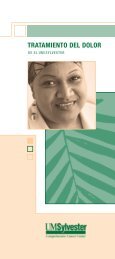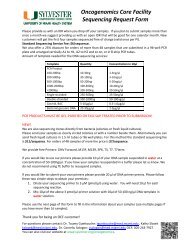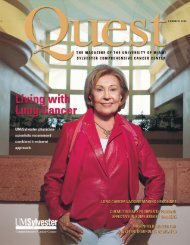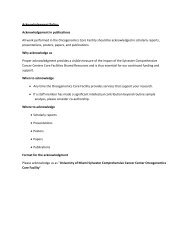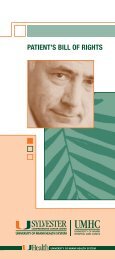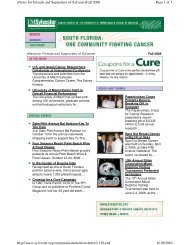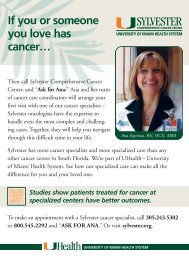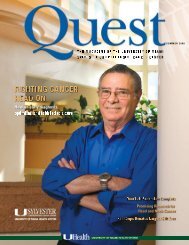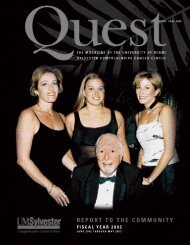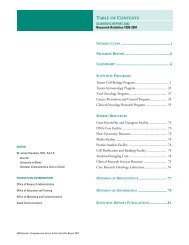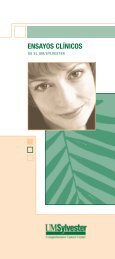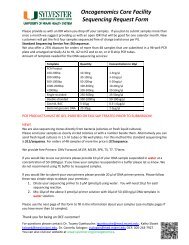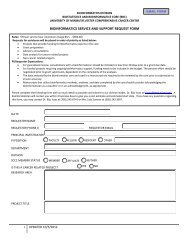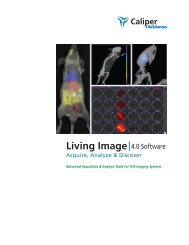SCIENTIFIC REPORT 2004 - Sylvester Comprehensive Cancer Center
SCIENTIFIC REPORT 2004 - Sylvester Comprehensive Cancer Center
SCIENTIFIC REPORT 2004 - Sylvester Comprehensive Cancer Center
Create successful ePaper yourself
Turn your PDF publications into a flip-book with our unique Google optimized e-Paper software.
C L I N I C A L O N C O L O G Y R E S E A R C H P R O G R A M<br />
HIGHLIGHTS/DISCOVERIES<br />
• Collaborated on a phase I trial of arginine<br />
deiminase in melanoma with promising results.<br />
A phase II protocol currently is under development.<br />
• Developed a phase I clinical trial for patients<br />
whose brain tumors expressed a procollagenlike<br />
protein, based on Dr. Feun and Niramol<br />
Savaraj, M.D.’s in vitro discovery that this<br />
protein may predict clinical response to vitamin<br />
D therapy. This trial has been approved by the<br />
Institutional Review Board (IRB); the Investigational<br />
New Drug (IND) application is under<br />
review by the Food and Drug Administration<br />
(FDA).<br />
AWTAR GANJU-KRISHAN, PH.D.<br />
Professor of Radiation Oncology<br />
DESCRIPTION OF RESEARCH<br />
Most of Dr. Krishan’s current research<br />
focuses on:<br />
• Monitoring of nuclear hormone receptor expression<br />
in human breast and prostate tumors.<br />
Dr. Krishan has developed flow cytometric<br />
methods for determining estrogen, androgen,<br />
and vitamin D receptor expression in archival<br />
human tumors. These methods recently have<br />
been used to determine expression in human<br />
male and female breast tumors and prostate<br />
tumors.<br />
• Evaluating a novel apoptosis assay with antibodies<br />
to ssDNA using flow cytometry; Dr.<br />
Krishan and Oscar Frankfurt, Ph.D., (University<br />
of Miami) have been studying the use of a<br />
novel method for discriminating between<br />
apoptotic and the necrotic cells by laser flow<br />
cytometry, which was recently published.<br />
• Evaluating tumor cells in body fluids using high<br />
resolution flow cytometry; Dr. Krishan and his<br />
colleagues have recently developed a high resolution<br />
flow cytometer with funding from NASA<br />
and the American <strong>Cancer</strong> Society (ACS). This<br />
instrument can measure nuclear volume and<br />
thus discriminate between normal and tumor<br />
cells. Supported by an exploratory grant from<br />
the NIH-NCI, they are currently examining the<br />
potential of this technique for detecting occult<br />
tumor cells in body fluids from cancer patients.<br />
• Studying androgen receptor expression in human<br />
prostate tumors; Dr. Krishan and May<br />
Abdel-Wahab, M.D., Ph.D., have used flow<br />
cytometric methods to correlate receptor expression<br />
with clinical response in patients on<br />
the Radiation Therapy Oncology Group’s<br />
(RTOG) study of radiation and hormone<br />
therapy in prostate cancer patients.<br />
• Evaluating DNA aneuploidy and S-phase fraction<br />
as indicators of response to chemoradiotherapy<br />
in patients with invasive cervical<br />
carcinoma; Dr. Krishan, Aaron H. Wolfson,<br />
M.D., and Daniel Estape, M.D., are involved<br />
in this project, which is funded by the RTOG<br />
and seeks to use high-resolution flow cytometry<br />
for the analysis of aneuploidy and cell cycle distribution<br />
in human cervical cancer under a<br />
University of Miami IRB-approved protocol.<br />
• Organizing annual Indo-U.S. workshops in<br />
cytomics. These workshops include six to ten<br />
U.S. faculty members along with their Indian<br />
counterparts, who teach the latest methods in<br />
flow cytometry in India. Up to 50 researchers<br />
attend these workshops, and so far, four workshops<br />
have been held in research institutes/<br />
universities in Chandigarh, Hyderabad, Jammu,<br />
and Bombay.<br />
36<br />
UM/<strong>Sylvester</strong> <strong>Comprehensive</strong> <strong>Cancer</strong> <strong>Center</strong> Scientific Report <strong>2004</strong>



